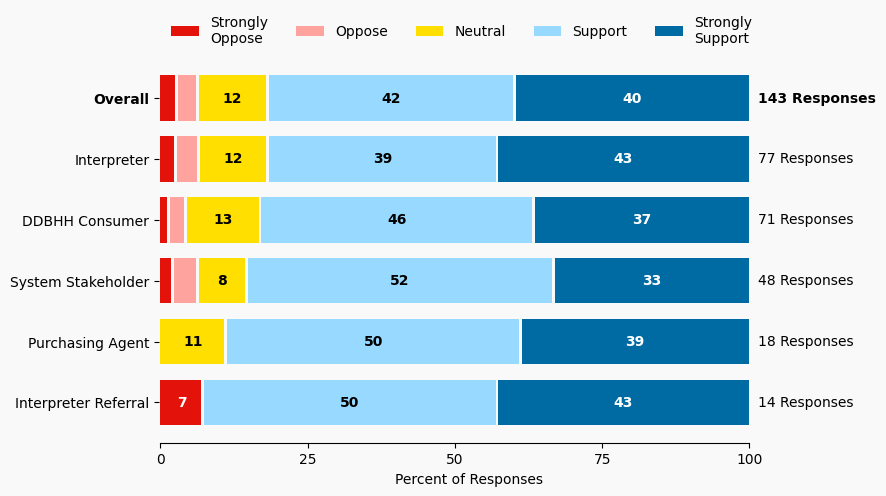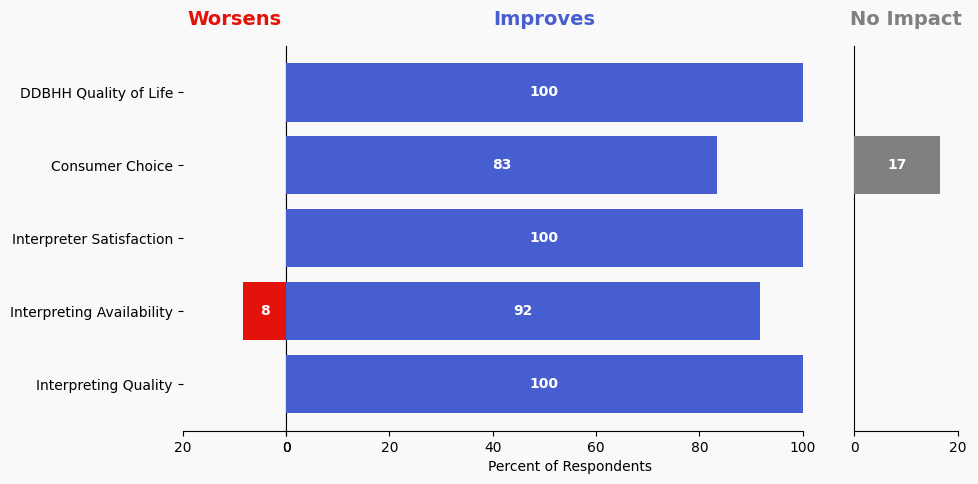26 Mentor Programs Focus on CDIs Mentoring Hearing Interpreters
Issue: Hearing interpreters report needing more mentoring to advance their skills. Often ASL fluency is a challenge for newer interpreters.
Proposed Solution: Interpreter referral companies to receive state funding via State Services to hire more full-time CDIs on staff and create a program where CDIs are mentoring hearing interpreters. Staff CDIs and Certified Hearing Interpreters (CHIs) serve as mentors for interns in a graduation-to-certification model program. Mentoring training is available via CATIE Center or other sources. CDIs and hearing intern interpreters can also be assigned to interpret for consumers; thus, helping with covering interpreting demands. CDIs would be preferred mentors for hearing interpreters due to their language skills and training in interpreting. CDIs also bring the consumers’ perspectives, which will aid with empathy and increased awareness for hearing interpreters.
Expected outcome: Immediate increased availability and quality of interpreting services. More Deaf interpreters are employed and influencing the next generation of CHIs. DDBHH consumers gain more exposure to the benefits of working with CDIs..
Who is impacted: Deaf interpreters, hearing team interpreters, consumers
Timeline: 6 months

Summary of Support Image Description
The stacked bar charts show how respondents rated their level of support and the total number of responses. The percentage for the five support levels is shown from left to right: Strongly Oppose (Dark Red), Oppose (Light Red), Neutral (Yellow), Support (Light Blue), and Strongly Support (Dark Blue).
Respondents may identify with multiple subgroups. The overall level of support is:
Overall
Strongly Oppose: 3%
Oppose: 3%
Neutral: 12%
Support: 42%
Strongly Support: 40%
Click to see the detailed image description for each subgroup.
Interpreter
Strongly Oppose: 3%
Oppose: 4%
Neutral: 12%
Support: 39%
Strongly Support: 43%
Purchasing Agent
Strongly Oppose: 0%
Oppose: 0%
Neutral: 11%
Support: 50%
Strongly Support: 39%
DDBHH Consumer
Strongly Oppose: 1%
Oppose: 3%
Neutral: 13%
Support: 46%
Strongly Support: 37%
Interpreter Referral
Strongly Oppose: 7%
Oppose: 0%
Neutral: 0%
Support: 50%
Strongly Support: 43%
System Stakeholder
Strongly Oppose: 2%
Oppose: 4%
Neutral: 8%
Support: 52%
Strongly Support: 33%
Overview of Respondents Opting for In-Depth Solution Analysis
After indicating their support level, 10% of the 143 respondents opted in to further assess whether the solution would worsen or improve on five metrics. Of the opt-in reviewers (15 respondents), 93% supported the solution, 0% were neutral on the solution, and 6% opposed the solution.
The remaining 128 respondents did not opt in to further assess the solution. Of these people, 80% support the solution, 13% were neutral on the solution, and 6% opposed the solution.
Reviewer Evaluation of Solution Effectiveness

Solution Effectiveness Image Description
The stacked bar charts show how respondents assessed the effectiveness of this solution based on five metrics. For each metric, the percentage of respondents is shown from left to right: Worsens (Red), Improves (Blue), No Impact (Gray).
DDBHH Quality of Life
Makes It Worse 0%
Makes It Better 100%
No Impact 0%
Interpreter Satisfaction
Makes It Worse 0%
Makes It Better 100%
No Impact 0%
Consumer Choice
Makes It Worse 0%
Makes It Better 83%
No Impact 16%
Interpreting Availability
Makes It Worse 8%
Makes It Better 91%
No Impact 0%
Interpreting Quality
Makes It Worse 0%
Makes It Better 100%
No Impact 0%
Reviewer Feedback and Insights
Interpreter
Comments from Interpreters express the need for more mentoring opportunities, with a focus on accountability and inclusivity. Suggestions include involving multiple agencies and ensuring all CDIs and CHIs have equal opportunities for job requests. Concerns include the potential for CDIs to see hearing interpreters as mentees instead of equal team members.
Deaf, DeafBlind, Hard of Hearing
Comments from DDBHH Consumers suggest that more training is needed for interpreters on how to work with Deaf interpreters. Concerns include maintaining inclusivity and avoiding monopolization by a single interpreting agency. Suggestions include providing mentoring services through various agencies to allow broader opportunities.
System Stakeholder
Comments from System stakeholders suggest that limiting mentoring to CDIs may pose challenges, as not all CDIs may want to provide mentorship. One comment suggests providing ASL mentoring by Deaf individuals and prioritizing quality assurance and training on how to mentor hearing interpreters.
PREVIOUS SOLUTION
25 Invest in CDI Professional Development
Issue: Deaf interpreters in Minnesota have great potential as a sustainable profession. With a larger DeafBlind population, there is more demand for Deaf interpreters to work with DeafBlind people in all settings. Recent trends indicate that CDIs will continue to be used for press conferences. Further, state legislation passed that allows for CDIs in the classroom and for the expense of a CDI to be reimbursable from the state. In addition to immigrant populations and the need for CDIs in court and legal settings, there are more settings where CDIs can benefit DDBHH consumers and hearing team interpreters. With this, continued investment in CDIs’ professional development is necessary.
NEXT SOLUTION
27 Establish Grievance Process for Quality Control – Restorative and Timely Process
Issue: When something goes poorly in an interpreting setting, there are multiple considerations and perspectives. Sometimes there is gross negligence or incompetence on the part of the interpreter, and someone is grievously harmed. However, many concerns about interpreter performance could be resolved and harm repaired without legal or exhaustive and sometime ineffective processes. Constructive solutions rather than harsh or destructive penalties would not only be more humane but could also build the understanding and skill of working interpreters. A restorative approach would seek to make right whatever harm has been done and repair and strengthen relationships.
Leave a Reply